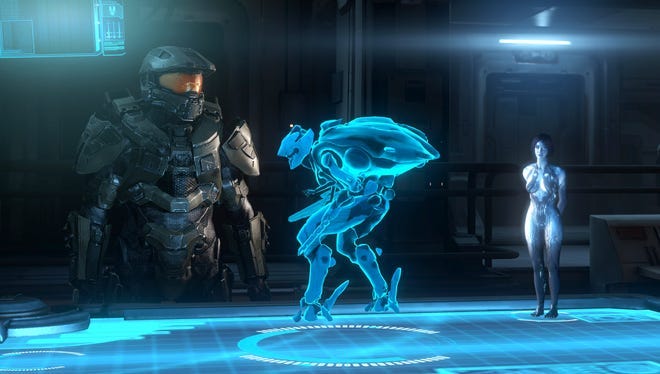Doing Master Chief Dirty
Or, a masterclass on lazy television writing
I’m not the world’s biggest Halo fan; my heart and soul belong to Mass Effect. But I’ve played enough of the video game series over the past two decades – including the most recent entry, last year’s Halo Infinite – to have more than a passing familiarity with its characters and setting. As a result, I know enough about Halo to understand that the new television show based on the game doesn’t understand its own protagonist, the super-soldier Master Chief, on a fundamental level. After watching Halo, I hope that Mass Effect never suffers the misfortune of a live action adaptation.
Halo’s bizarre and convoluted lore need not concern us here. Indeed, it barely concerns the game’s players or even its own developers. Suffice it to say that Master Chief must save humanity and the galaxy at large over the course of six main Halo games by shooting innumerable aliens and blowing many things up. It’s fairly standard stuff for the first-person shooter genre, and it’s one mated with fluid and consistently well-executed run-and-gun gameplay mechanics. Nor is Master Chief a terribly complex or fully realized character, even by the rather unexacting standards of turn-of-the-millennium video games.
But that doesn’t make Master Chief an empty cipher, at least not in the way he’s evolved since his first appearance in the original 2001 game. He certainly started life as a non-dimensional avatar for the power fantasies of video game players, but over time Master Chief has taken on certain traits that make him more than an anonymous warrior in a distinctive suit of green armor.
Indeed, it's far too easy to dismiss a badass super-soldier like Master Chief as a power fantasy and simple exercise in wish fulfillment. There’s no denying that he’s both of these things, and like virtually every other protagonist in the first-person shooter genre Master Chief rips through the ranks of his adversaries with a brutal, savage efficiency. But over the course of the series Master Chief’s battlefield exploits lend him an aura of otherworldly menace – at least among his enemies. He is their nightmare, the thing that goes bump in the night and frightens their children. Not for nothing do these opponents bestow the moniker “demon” upon him as the series goes on. Whatever its other shortcomings, Halo is self-aware enough to take this aspect of genre and incorporate it into its otherwise skeletal narrative.
This acknowledgment of the fundamental nature of first-person shooters doesn’t amount to a personality trait, however. If there’s any one attribute that Master Chief displays over the course of the Halo series, it’s an ingrained sense of duty to humanity and its protection above all else. It’s a quality that fits in well with the character’s relatively anonymous background; indeed, save one major exception Master Chief has little else to drive or motivate him. At the same time, it’s a characteristic that renders him almost inhuman. As one character in the most recent entry in the series reminds Master Chief, not everyone has the ability or fortitude to do what he does.
But it’s Master Chief’s relationship with Cortana, his own personal artificial intelligence construct, that’s the emotional crux of the Halo series. She sees and brings out the humanity in Master Chief – and it’s an unacknowledged irony of the Halo games that it takes an artificial intelligence to imbue its main character with any semblance of fellow feeling. That comes across crystal clear in Halo Infinite, where the echoes of a now-deleted Cortana haunt Master Chief and compound the guilt he feels over his own failure to protect her. Over the course of the game, however, Master Chief forges a new bond with Cortana’s doppelganger as they work together to neutralize yet another threat to the galaxy.
None of this should be taken to suggest that Master Chief is a particularly deep or compelling character – he’s not. But there are enough building blocks available in the existing Halo game narrative for writers, actors, and the like to craft a cohesive and interesting story for a live action television series. There’s no need for these creative types to pretend that he’s a complete non-entity without any distinguishing characteristics or attributes, nothing but a vehicle for the power fantasies of video game players who needs to be fleshed out and, as Master Chief actor Pablo Schreiber put it, “discover elements of himself.”
Whether born of indifference for the Halo games themselves or contempt for video games in general, this failure to understand Master Chief as a character represents a missed creative opportunity. Instead of taking up the challenges inherent in translating a faceless protagonist like Master Chief to live action, the writers of the Halo television series took the lazy way out and served up a warmed-over soldier-questioning-orders plot. It’s not like there’s nothing to work with from the games themselves, and it takes effort to ignore the dramatic potential in a mostly anonymous character driven almost solely by duty and whose own humanity we mainly see refracted through his relationship with an AI construct. There are a number of directions it’s possible to go with the character, even if the games themselves never quite do it.
We’re just two episodes into the Halo series, so these judgments are necessarily preliminary. It’s entirely possible that the show could turn things around in the remaining entries, but it’s not off to a great start. Based on these first two episodes, however, there’s little reason for optimism, and audiences can be forgiven for bailing on the series based on what they’ve seen so far.

